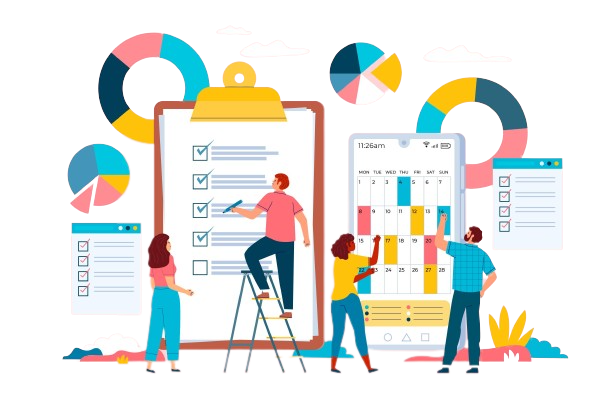By leveraging nonprofit case management software in today’s fast-paced digital age, human services non-profit organizations can streamline operations, optimize their workflows, and achieve more with less.
The following five ways and real life client case studies to illustrate how non-profit software can optimize human services programs and help provide better services to clients.
1. Streamline Communication with Clients
Effective communication is vital in human services activities as it ensures clients receive the support they need while helping organizations understand the needs of their clients. Non-profit software with case management tools can help optimize communication between clients and staff, leading to better service delivery.
One example of case management software is Casebook, a cloud-based platform streamlining communication and case management for non-profit organizations. Casebook includes tools such as secure messaging and video chat, which allow clients and staff to communicate effectively without needing face-to-face meetings.
Streamlined communication has several benefits for both clients and staff, including;
- Clients can receive timely updates and notifications about their cases
- The team can easily track case progress and collaborate with colleagues.
- The staff can enjoy reduced administrative burdens, allowing them to focus on providing quality service and programs to clients.
Casebook’s client communication tool has been successfully implemented by The Haven Home, which supports under-resourced women and their children in Cleveland. The organization found Casebook’s secure messaging and video chat tools allowed more efficient and effective communication between staff and clients. In turn, it has resulted in improved case outcomes and client satisfaction.
2. Automate Tedious Tasks
Human services organizations have to handle a significant amount of paperwork and repetitive tasks pertaining to both internal and mandated processes, which can be time-consuming and can take away from their ability to provide quality services. Nonprofit human services organizations can select a case management solution to automate these tasks, freeing up staff time for more meaningful work.
Casebook includes automation tools such as configurable workflows and templates that organizations can use to streamline processes and eliminate manual tasks. Casebook’s automation tools have been enacted by the “For the Silent” organization, a non-profit supporting human trafficking and exploitation survivors.
By leveraging Casebook’s automation tools, For the Silent significantly reduced the time spent on manual data entry and administrative tasks, allowing staff to focus more on providing direct services to survivors. The organization streamlined its intake process and automated the creation of case files, reducing the time it took to serve clients and improving service delivery.
By automating tedious tasks, staff can focus on providing superior services and delivering better client outcomes. Additionally, automation can help organizations operate more efficiently and effectively, reducing costs.
3. Improve Data Management
Non-profit case management software or a type of crm software for nonprofit can help optimize data management by providing data entry, storage, analysis, and reporting tools.
Casebook offers configurable data management tools such as forms, assessments, and custom fields. Casebook’s tools enable organizations to manage client data more efficiently, reducing the risk of errors and duplication and providing a comprehensive view of each client’s case.
For instance, the Lansing Police Department in Michigan applied Casebook’s features to improve data management for their community outreach program. The department used the platform to create custom forms that officers could easily access and fill out in the field. This strategy eliminated the need for paper-based records and reduced the risk of data loss or errors.
Casebook’s data management tools allowed the department to accurately track client information, measure program outcomes, and make data-driven decisions to improve their services. By streamlining data entry and reducing the risk of errors, police officers in the department spent more time providing services and less time on administrative tasks.
4. Enhance Resource Allocation
All organizations find challenges when it comes to allocating resources effectively. Limited funding and staff can make providing adequate client support and services difficult. However, with case management tools or a case management system, organizations can optimize their resource allocation and make the most of what they have.
One successful case study of resource allocation optimization is Alpha-Omega Miracle Home, a charity organization that supports women and children in need. The organization faced challenges managing resources effectively and struggled to meet the service demand.
However, after implementing Casebook, they were able to streamline their operations and allocate resources more efficiently. The tool allowed them to track and manage their resources in real time, which made it easier to identify areas where resources were over or underutilized.
5. Reduce Administrative Costs
Human service non-profit organizations face significant financial constraints, and administrative costs can majorly burden budgets. By leveraging the right software tools organizations can reduce administrative costs and allocate more resources toward their mission.
Another helpful tool is document management software, which streamlines administrative tasks such as filing, storing, and retrieving important documents. It can help organizations reduce the need for physical storage space and make it easier for staff to access information quickly and easily.
One case study that illustrates the benefits of reduced administrative costs through software implementation is that of the PA Parent and Family Alliance (PPFA). Before implementing Casebook, PPFA spent significant time and effort managing manual processes.
By automating these tasks, the organization was able to reduce administrative costs and allocate more resources toward its core mission of providing support to families and the community they serve.
Maximize Efficiency in Human Services With Casebook
Human services organizations can optimize their operations through the use of low cost nonprofit case management software.
Casebook offers a range of human services software solutions, such as nonprofit case management software with its configurable platform built just for human and social services. Contact us today to optimize your human services operations, or schedule a demo to see how our technology can help you provide better services to your clients.



